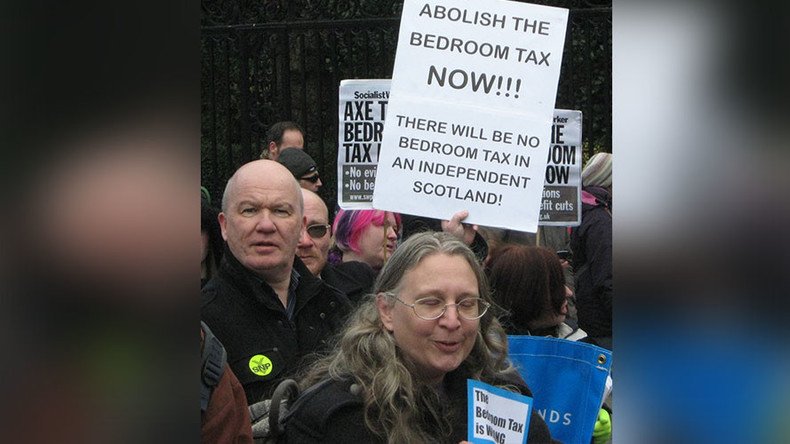Hated Tory ‘bedroom tax’ discriminated against disabled claimants, court rules

Tory welfare reforms suffered a blow in the Supreme Court as judges ruled the government acted outside of the law when it imposed its so-called ‘bedroom tax’ on a woman suffering from spina bifida and a couple caring for their disabled grandson.
The highest court in the land overturned a 2014 decision by the Court of Appeal which ruled against Jacqueline Carmichael and her husband Jayson who live in a two-bedroom housing association flat in Southport.
The government cut the Carmichaels’ housing benefit by 14 percent because they had an extra bedroom in their home. However, the court accepted the couple’s claim that due to her condition Jacqueline Carmichael has to spend most of her day on a hospital-like bed that does not fit in the room where her partner sleeps.
The appeal court originally ruled there was “an objective reasonable justification” for applying the bedroom tax to the Carmichaels when a family with a child in similar circumstances would have been exempt. The best interests of children, it said, were a primary consideration.
But High Court justice Lord Toulson refuted the claim on Wednesday, saying: “I can see that there may be some respects in which differential treatment of children and adults regarding the occupation of bedrooms may have a sensible explanation.
“Expecting children to share a bedroom is not the same as expecting adults to do so.
“But I cannot, with respect, see a sensible reason for distinguishing between adult partners who cannot share a bedroom because of disability and children who cannot do so because of disability. And the same applies also to distinguishing between adults and children in need of an overnight carer."
By siding with the Carmichaels the Supreme Court acknowledged Jacqueline’s right not to be discriminated against as defined under Article 14 of the European Convention of Human Rights, as well as Article 8 which highlights the right to private and family life.
Together with the Rutherfords, we have won our latest fight for disabled children hit by the #bedroomtax Please share to show your support pic.twitter.com/wJSmiOvGgQ
— Child Poverty Action (@CPAGUK) November 9, 2016
In a statement the Carmichaels said they were "overjoyed" by the decision and that they hoped "others get justice too."
“We have been through almost four years of the sheer hell of the bedroom tax policy, and this decision vindicates our long and difficult fight,” I they added.
“Out of this human rights victory over the bedroom tax we ask [Prime Minister] Theresa May to now reconsider the whole policy for everyone.”
Further appellants Paula and Sue Rutherford from Pembrokeshire, whose teenage grandson Warren needs around-the-clock care, also won their case, as the Supreme Court dismissed an appeal from the government against a favorable ruling by the Court of Appeal made in January.
“For Paul and Susan Rutherford, the judgment lifts an enormous burden of uncertainty about their grandson’s future – an uncertainty they’ve had to live with since 2013 when the legal process started,” said Child Poverty Action legal spokeswoman Sophie Earnshaw, who acted on behalf of the family.
“The Rutherfords’ legal ordeal is finally over. These are ordinary grandparents who have dedicated their lives to caring for their grandson; they have won much-needed rights for families who care for disabled children who need overnight care. We are all in their debt that they were prepared to stick with it to the end.”
#bedroomtax families outside Supreme Court. Judgement expected in next few minutes pic.twitter.com/gc5xLcwlLk
— Real Britain (@realbritainros) November 9, 2016
In response to the day’s rulings, a Department for Work and Pensions spokesman said: “We will take steps to ensure we comply with the judgment in due course.
“In most cases, local authorities are best-placed to understand the needs of their residents, which is why we will have given them over £1 billion [US$1.23 billion] by the end of this parliament for discretionary housing payments to ensure that people in difficult situations don’t lose out.”













